The MSR FreeLite 2 is one of the lightest 2-person double-wall tents on the market. It also has a roomy, fully rectangular floor, an easy-to-pitch semi-freestanding design, and provides the excellent weather protection we’ve come to depend on from MSR over the years.
But how does the FreeLite 2 stack up against the other top tent contenders? Can it actually sleep two people comfortably? Will its lightweight materials hold up over time? And ultimately, is it worth the fairly significant investment?
We put the FreeLite 2 to the test in rugged conditions to see how well it performs compared to the best-selling tents in this popular category.
Quick Specs
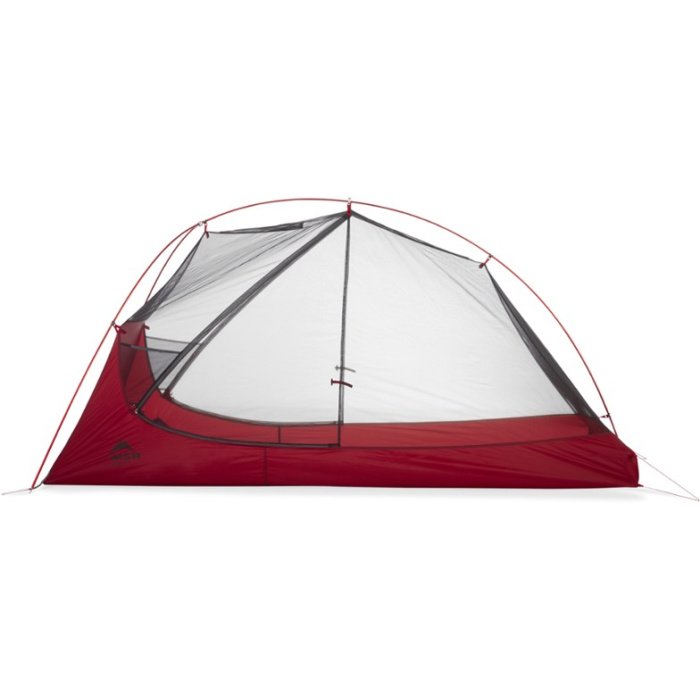
MSR FreeLite 2
Good Balance of Weight & Livability for Solo Hikers
Price:
$450
Weight:
2 lb. 5 oz.
Dimensions (LxWxH):
84 x 50 x 39 in.
Type:
Semi-freestanding
Floor Area:
29 sq. ft.
Vestibule Area:
7.5 + 7.5 sq. ft.
Pockets:
3
Packed Size:
18 x 4.5 in.
Pros
- Ultralight
- Roomy for one
- Two doors/vestibules (a perk for solo hikers)
- Convenient pockets
- Rainfly gutter prevents drippy entry
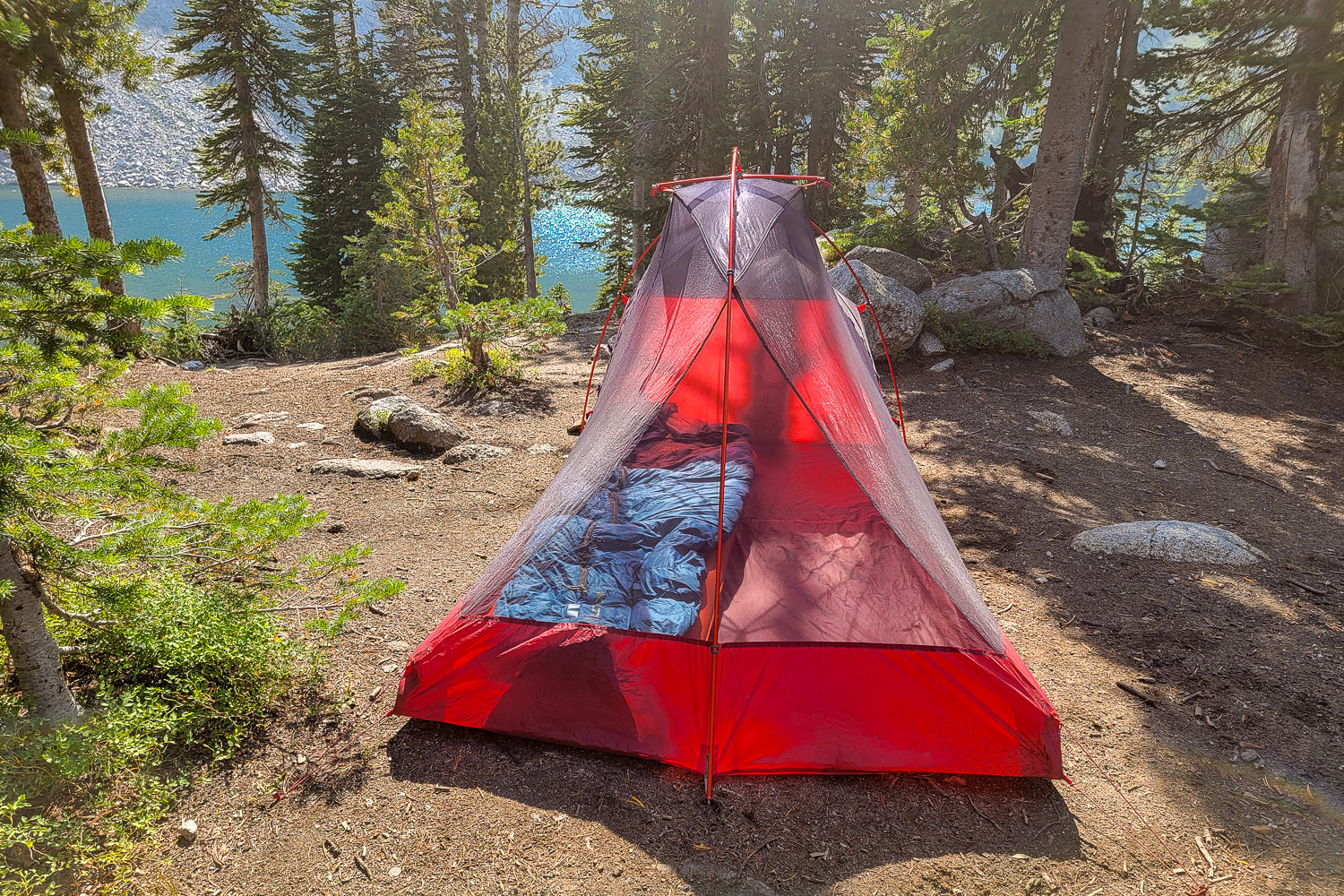
Pros
Lightweight
The FreeLite 2 weighs 2 pounds, 5 ounces, making it one of the lightest 2-person double-wall tents on the market. The closest competing ultralight tents in the semi-freestanding category are the Big Agnes Tiger Wall UL2 and NEMO Hornet OSMO 2 – both of which we also like. You’ll find all three tents on our list of the Best Backpacking Tents for slightly different reasons.
The FreeLite 2 is exceptionally easy to carry on trail when split with a partner, but it’s also a great option for solo hikers since its weight is comparable (if not lighter) to many of the top one-person tents on the market. For example, the Big Agnes Copper Spur HV UL1 weighs in at 38 ounces, and the MSR Hubba Hubba 1 tips the scale at 39 ounces. All three of these shelters are similar in weight and price, but the FreeLite 2 has much more internal space.
You could go even lighter by opting for a non-freestanding ultralight shelter or tarp, but those types of tents have some downsides that are dealbreakers for some backpackers – you’ll have to manage interior condensation and they are a bit more cumbersome to pitch.
Compact
Saving space is nearly as important as saving weight when you’re backpacking since a streamlined, non-bulky load is a lot more comfortable to carry. With the tent poles stashed in an exterior pocket, the body and fly of the FreeLite 2 compress down very small. This makes it easy to stow away, even in the efficient 40-50 liter backpacks we typically use.
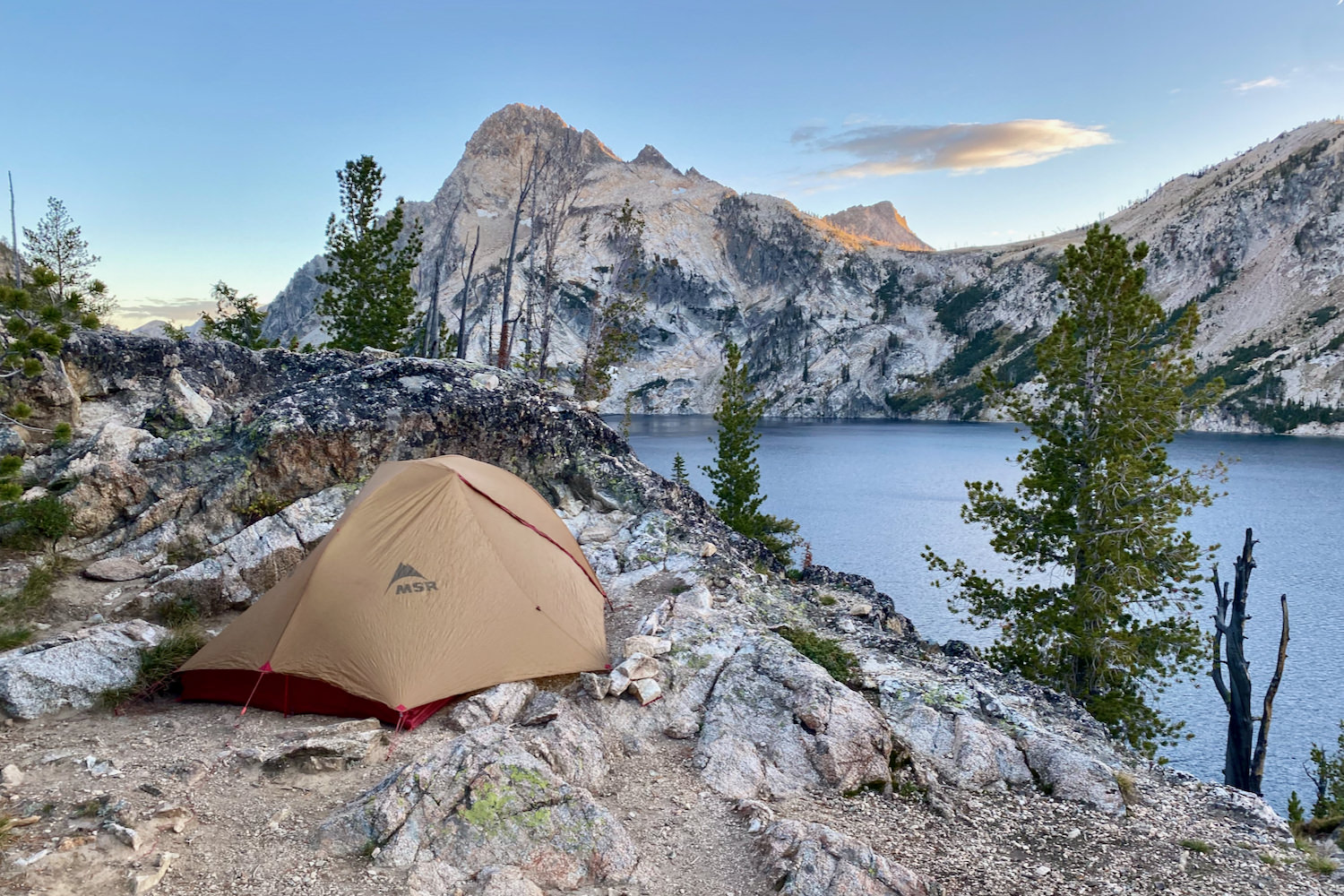
Roomy For One
The FreeLite 2 is designed as a two-person tent, but it truly shines as a solo shelter. This tent has a fully rectangular floor that doesn’t taper at the foot, so there’s plenty of space to accommodate a wide sleeping pad and any gear you want to stash securely inside the tent.
The FreeLite has pretty standard dimensions – with an 84-inch length and a peak height of 39 inches – so it’ll be a snug fit if you’re taller than 6 feet. But the extra space – about a foot on each side of your pad – makes this tent feel surprisingly spacious when you’re flying solo.
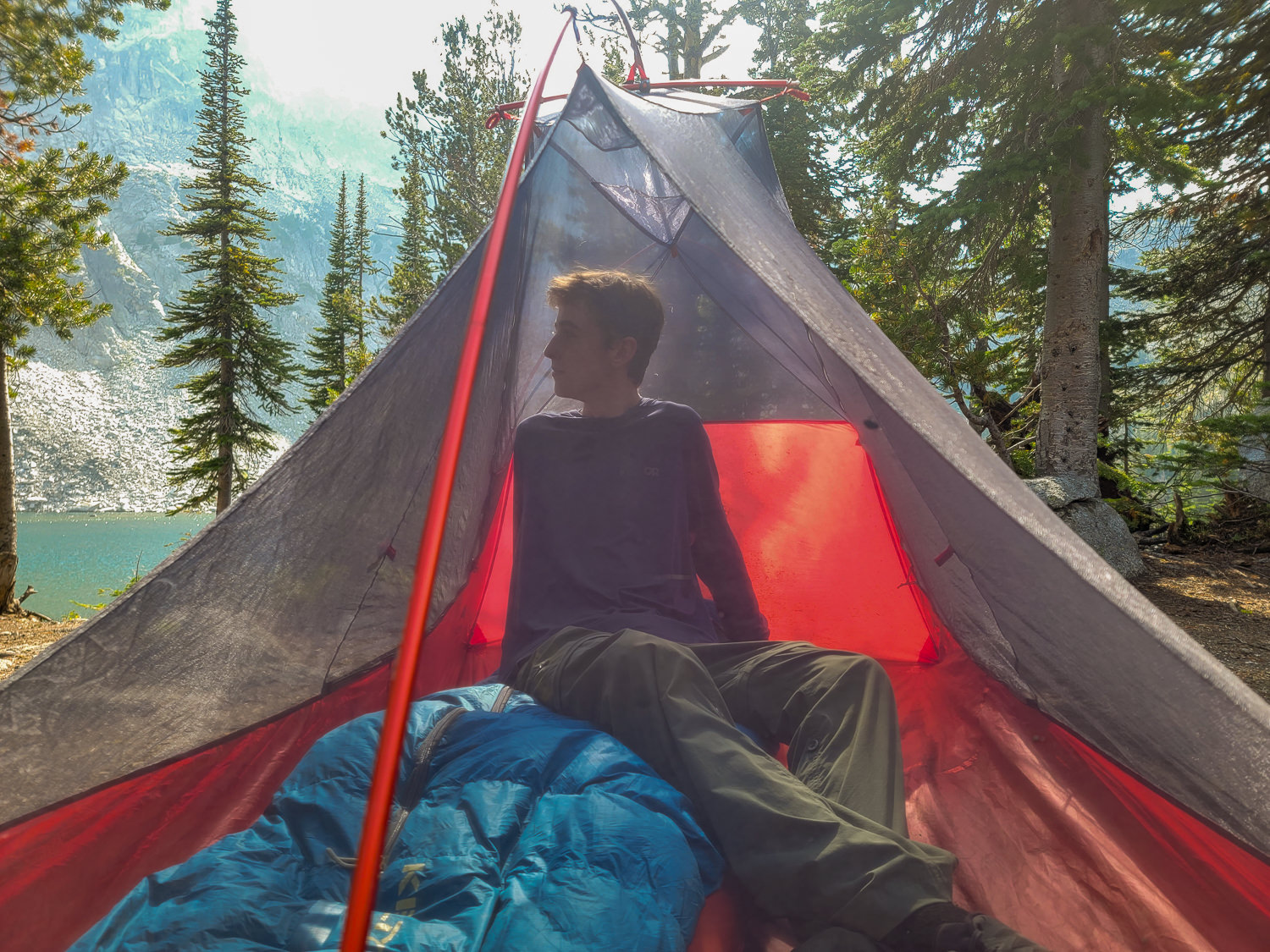
Easy to Pitch & Comfortable
The FreeLite is a semi-freestanding tent, which means it relies on a simple pole frame and four stakes at the corners for structure. Semi-freestanding tents are nice because they provide a great balance of weight savings, comfort, and ease of use. Unlike a fully freestanding tent, you’ll always need to stake out the corners of a semi-freestanding tent for a proper pitch, but we always stake our tent corners anyway.
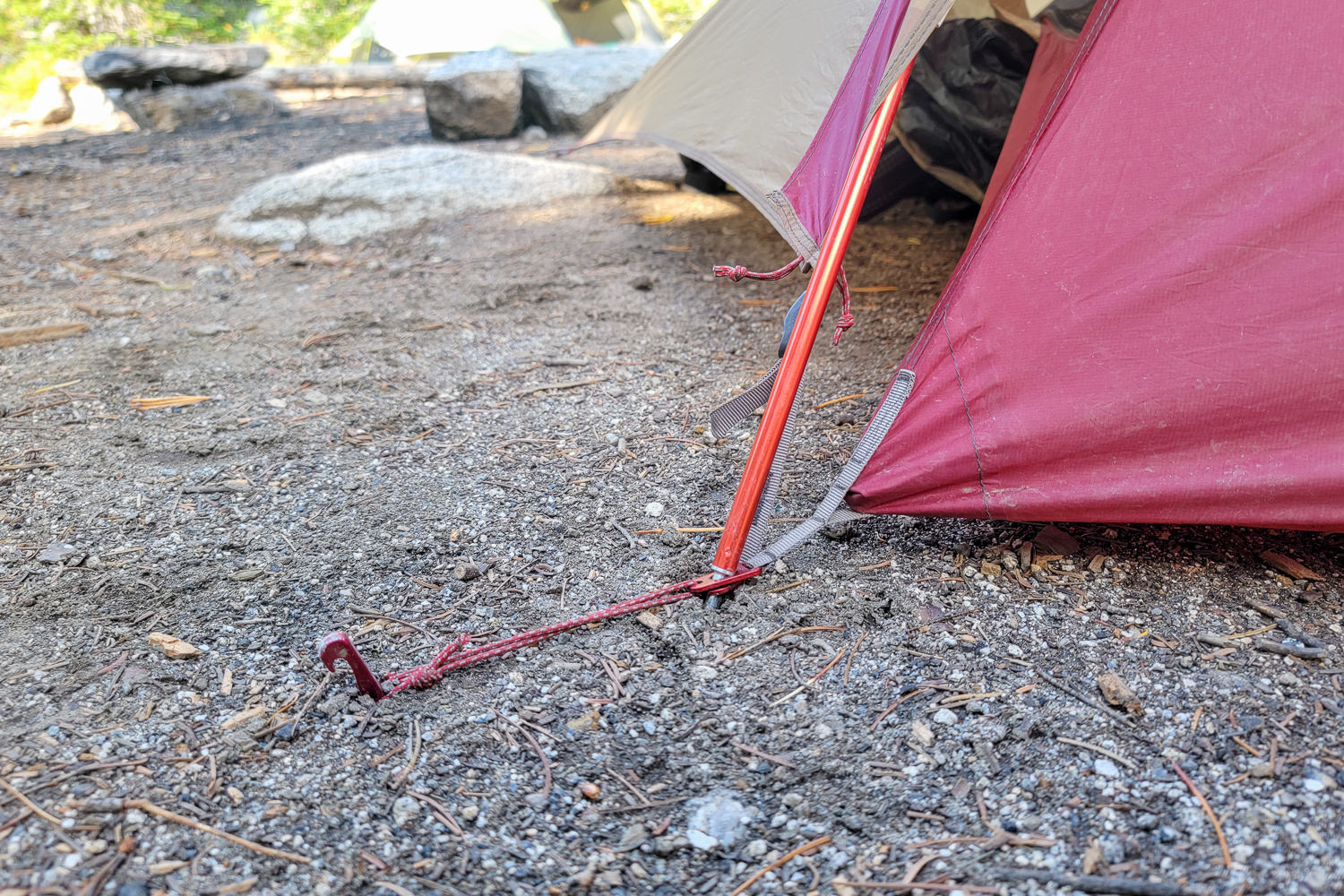
Two Doors & Vestibules
Another useful feature of the FreeLite is its dual doors and vestibules. Having two doors is pretty much essential in our book when sharing a tight-fitting backpacking tent with a partner, but it’s also a perk for solo hikers. Most one-person tents only have one door and vestibule, but with the FreeLite you’ll get one on each side of the tent for full ventilation, views, and storage.
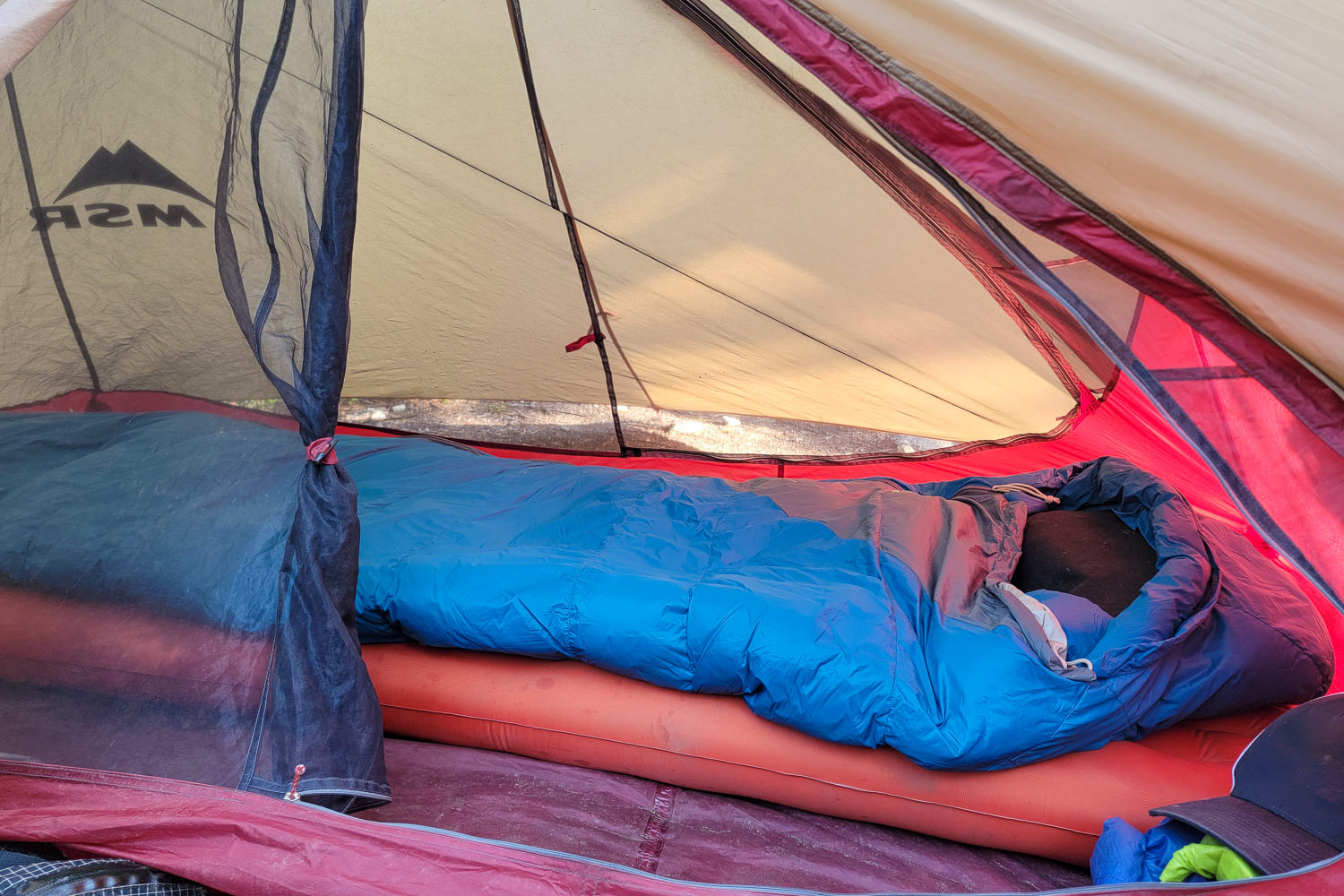
Trustworthy Weather Protection
The FreeLite has not let us down during testing in harsh weather conditions. Even in a torrential multi-day downpour in the Wallowas, we felt confident in this tent thanks to its fully waterproof, seam-taped fly, double-wall design, and steep dome shape that sheds water like a champ.
Keep in mind that the FreeLite is an ultralight shelter made for three-season conditions and always do your best to pitch it on high ground in reasonably sheltered sites. If you do that, you’ll be happy with its performance.
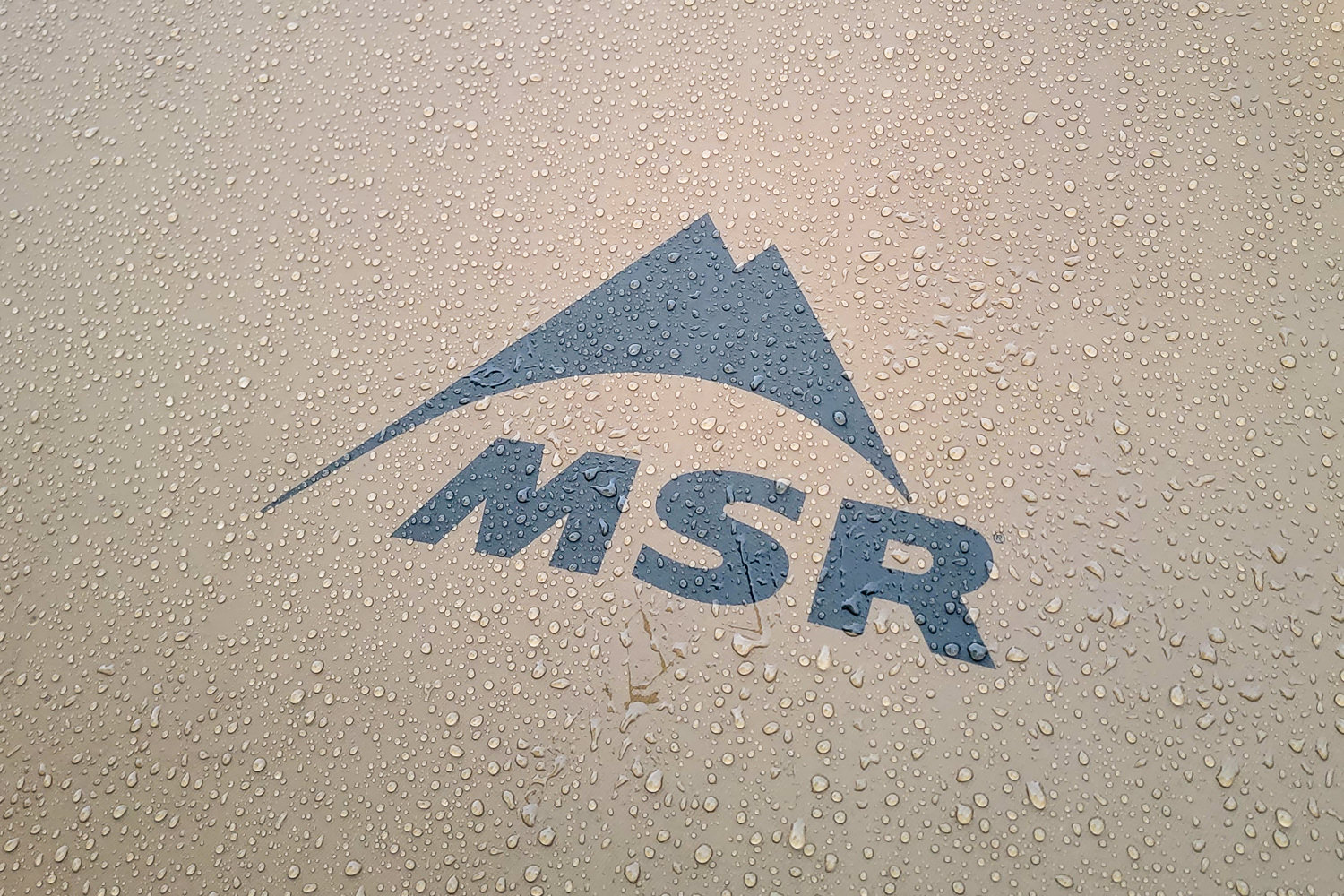
Rainfly Gutters
The FreeLite’s vestibule doors have small channels to direct rain away from entry points. This helps prevent water from dripping onto you and your gear when entering and exiting the tent. Small details like this really count in the backcountry when it’s critical to keep your camp clothes and sleeping bag dry.
Good Value
The FreeLite 2 currently retails for $450, which is competitive with the similarly equipped NEMO Hornet 2 and Big Agnes Tiger Wall UL2. If you’ll put it to good use, a high-quality tent like the FreeLite is well worth the investment since it’ll last for years of adventure.
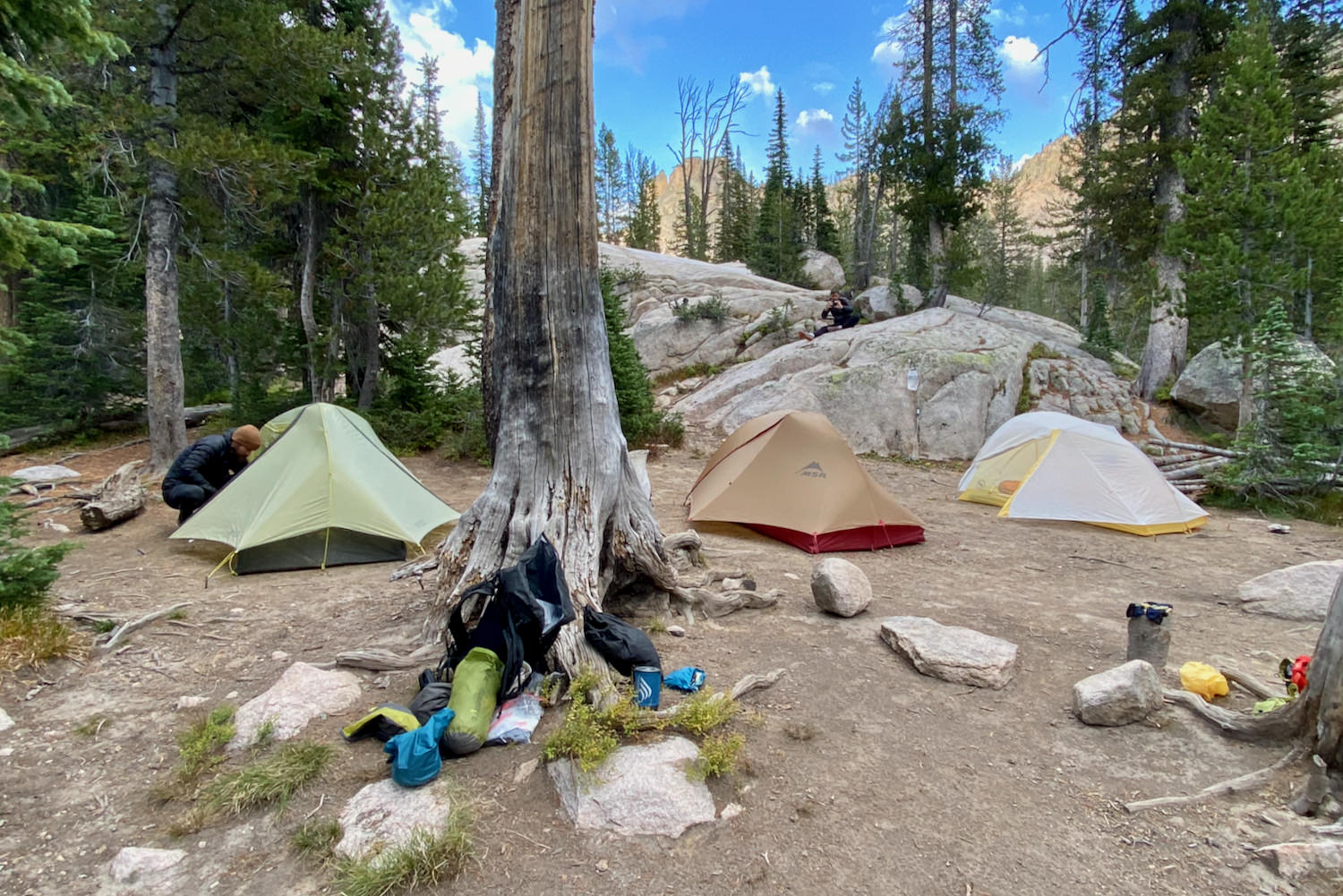
Cons
Tight for Two
The FreeLite 2 will work fine for two people who don’t mind getting up close and personal, but we like more space in our 2-person tents. Many hikers even bump up to a lightweight three-person tent for the extra sleeping pad and gear storage space.
Tents with longer brow poles across the top feel more spacious for two hikers sitting side by side since the sidewalls are more vertical, less slanted, and maximize space at the head and shoulders. The FreeLite has a relatively short brow pole, which is why we like it better for solo use. If you mostly plan to sleep two people in your tent and you’re looking for a bit more headroom, the Tiger Wall UL2 is a good option, as is the very spacious NEMO Hornet OSMO 3.
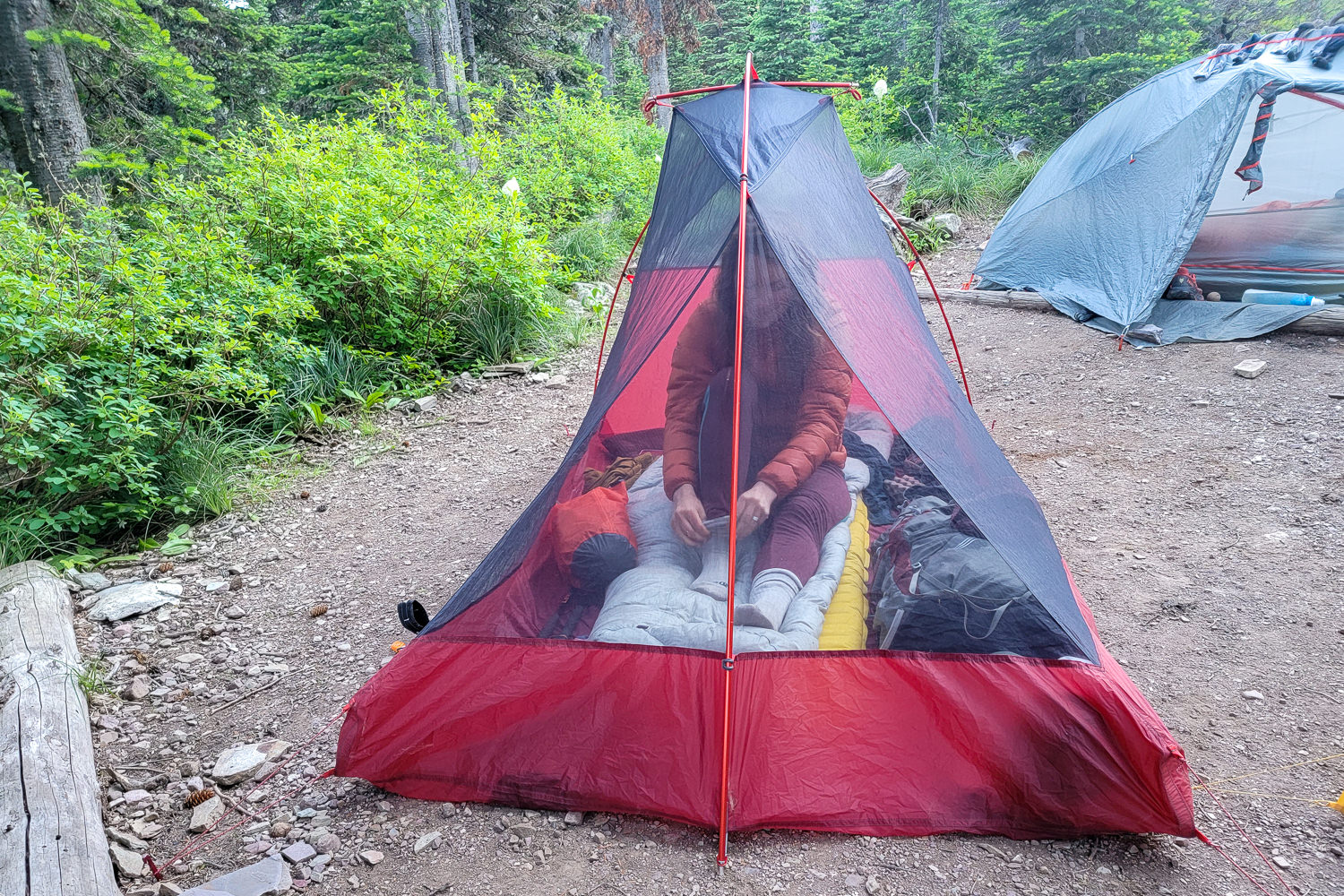
Pitch Needs Attention
Semi-freestanding models like the FreeLite 2 function best with a taut pitch. Because nylon tent fabrics stretch out a bit when cold and wet, you’ll want to make sure to re-tighten your guylines in adverse weather conditions. Without a taut pitch, semi-freestanding tents are more likely to blow around in the wind.
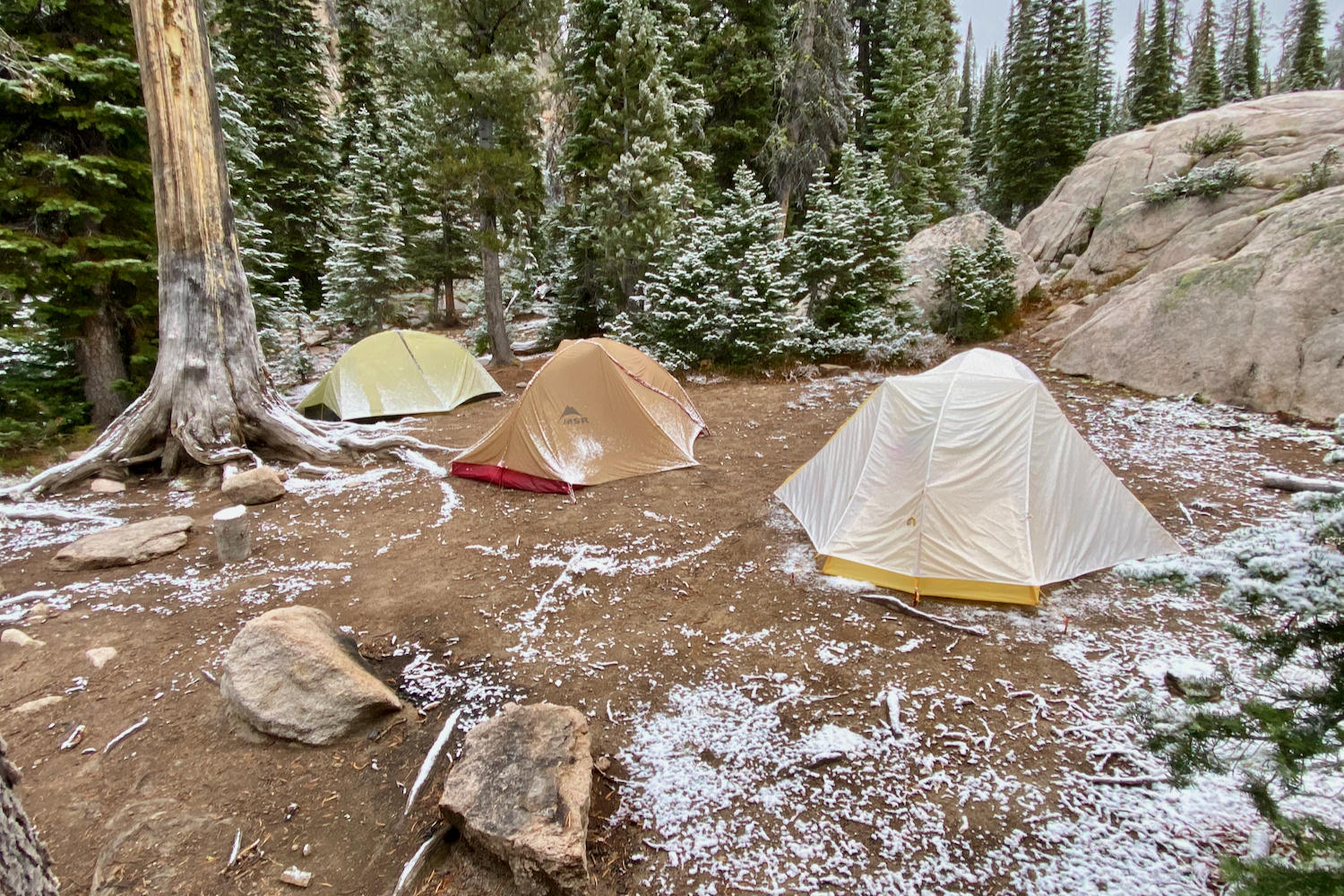
Heavier than Some
The FreeLite is an incredibly lightweight backpacking tent but it’s heavier than some of the leading non-freestanding shelters. A super streamlined tent like the Zpacks Duplex weighs only 18.5 ounces (not including trekking poles and stakes). For some hikers, it’s well worth dealing with the drawbacks of a non-freestanding tent to reduce pack weight by over a pound. However, the FreeLite is a good balance for those who prize convenience and weight savings equally.
Storage Pockets Lacking
The pockets in the FreeLite are fairly basic, which is pretty typical for ultralight tents. There are triangular pockets at the head and a small gear loft at the top of the tent. They’re passable, and offer some organization for a phone, headlamp, etc., but they’re pretty minimal. We’d prefer a large top pocket like the one on the Tiger Wall to stuff more clothing or gear and keep it up off of the floor. Though we wish the FreeLite had slightly better pockets, we can’t knock it too much since those things would all add weight to the design.
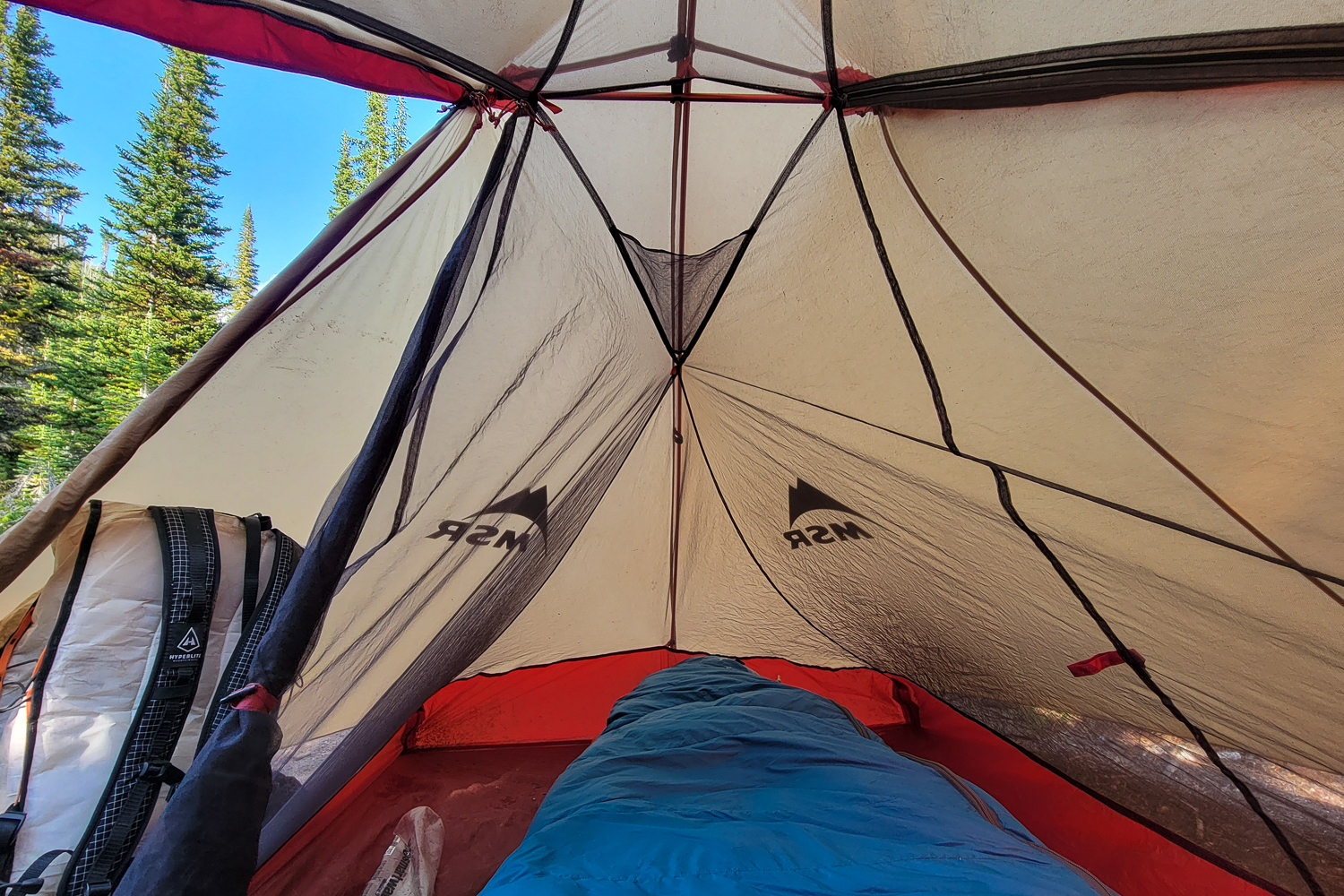
Condensation
The FreeLite is a minimalist tent and its rainfly lacks strutted ventilation ports to reduce weight. Not having built-in vents restricts the tent’s condensation control capabilities. The rainfly doors unzip from the top and bottom which helps circulate air, however, such vents aren’t optimal during heavy rainfall.
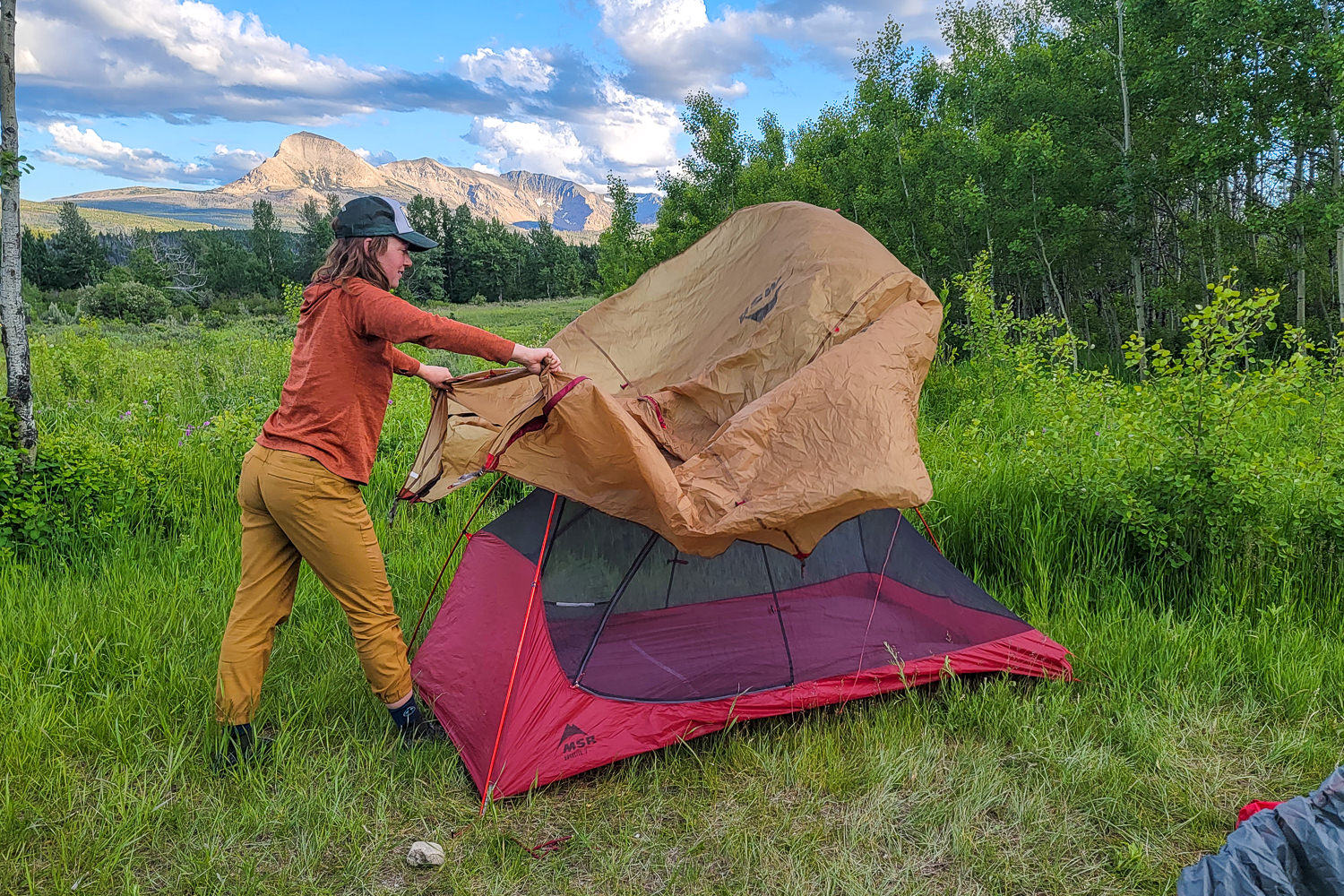
Bottom Line
The MSR FreeLite 2 is an excellent choice for anyone looking to reduce their pack weight without sacrificing the conveniences and weather protection of a semi-freestanding double-wall tent.
We really like this model for use on solo adventures, and it’s one of our favorite 1-person tent choices. The FreeLite’s specs are competitive with some of the most popular 1-person tent options, but it has far more room for sleeping and gear storage.
We feel that the FreeLite 2 will be a bit snug for many hiking pairs due to the steep slant of its sidewalls. That said, if you’re okay with more limited headroom, the fully rectangular floor space of the FreeLite provides enough room for two to lie down and sleep comfortably.
The FreeLite ticks a lot of boxes for us: It’s versatile enough for all kinds of trips and offers a great combo of comfort, weight, ease of use, and dependable weather protection. Overall, we view this as a high-quality option. If it’s the right fit for the type of backpacking shelter you’re looking for, we think you’ll love it.
